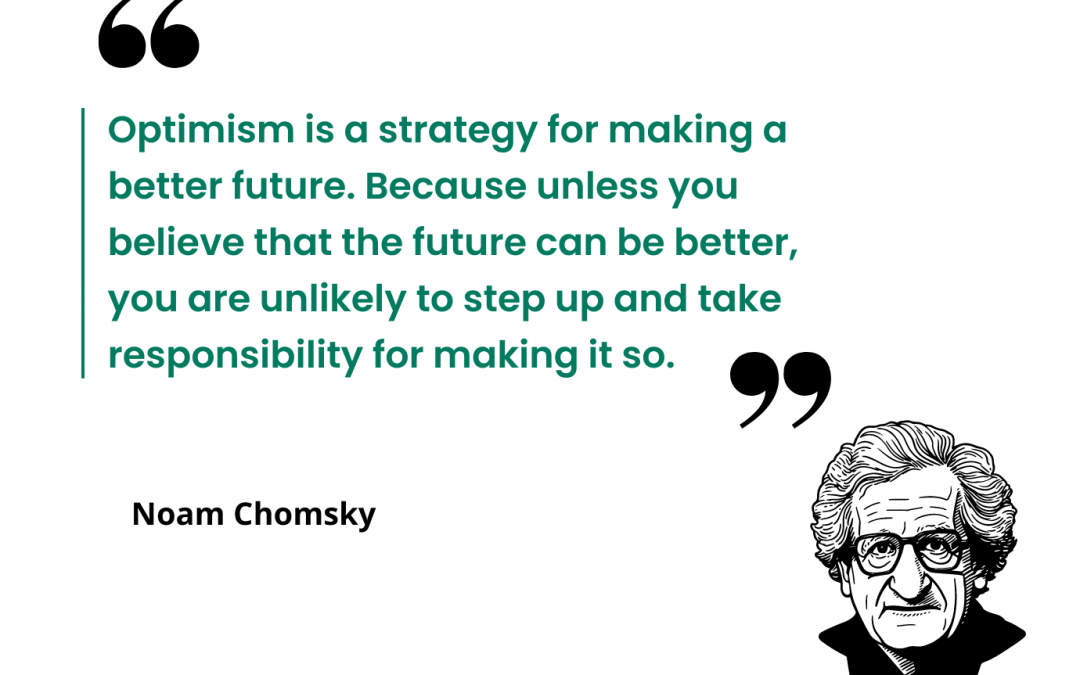A key aspect of mental toughness that, when added to Resilience, elevates it to a more useful concept.
Naom Chomsky is one of the great thinkers of our time. He is provocative in that he makes you stop and think about things that you might take for granted or simply accept without question. He has a wonderful ability to present his ideas simply and with astonishing clarity.
His observation on Optimism is very much in that vein.
Usefully it reinforces and provides perspective for the mental toughness concept and its fundamental relevance for everyone. It also sums up why Resilience – with which mental toughness is often confused – is important but it is not enough.
Its cousin, Positivity or Optimism, is just as important. These are the two major components of the Mental Toughness concept:
Resilience can be understood as the ability to recover from adversity. In other words, if something goes awry, we can pick ourselves up, dust ourselves off and try to achieve what we originally intended before the adverse event.
If we think and act like this, this is largely a passive response. It is rearward-looking. We are responding to something that has happened. This is about survival. It’s valuable. Sometimes survival is what we need.
As Chomsky suggests and many others have found, most of us would also prefer to thrive and grow and aspire to something better than what we have now. This is where positivity and optimism enter the picture.
The Cambridge University dictionary defines Optimism as “the quality of being full of hope and emphasizing the good parts of a situation, or a belief that something good will happen” and Positivity as “Positivity as “the quality of having a positive attitude”.
They are closely related. This enables us to do more than survive. It enables us to thrive.
And, as the image suggests, this can be broadly understood and assessed through the factors contributing to the Challenge and Confidence constructs. These describe aspects of our mental approach to what we face today and what we might face going forward.
The Challenge factors describe being open to risk, the unknown and opportunity and not allowing concerns about what lies ahead to get in the way of seeking them out and embracing them. Together with recognising that setbacks will occur but that you can learn from all of them to create new solutions.
It is also down to the Confidence factors – having the self-belief in one’s abilities to deal with whatever occurs and to feel you have the toolkit of skills and knowledge to deal with what lies ahead. Including the ability to engage with others to deal collaboratively to grasp opportunity.
Compared to resilience, this is an altogether more proactive response. It captures the notions of optimism and anticipation – we know the world has its challenges and threats, many as yet unknown, but we can, if so minded, approach them positively and with optimism and create a better future.
A mentally tough individual is more likely to see challenge and adversity as an opportunity and not a threat and has the confidence and optimism to seek that better future.
It is the recipe for thriving.
Usefully we can understand mental toughness and what it offers through the 4Cs mental toughness concept. Even more usefully, we can assess it in ourselves and, if a practitioner, in others through the MTQPlus psychometric. It’s the platform from which Chomsky’s vision for growth and development can spring.
For more information about the mental toughness concept and the mental toughness measure – MTQPlus contact: headoffice@aqrinternational.co.uk or go to https://aqrinternational.co.uk/product/mtqplus-assessment
For information about becoming a licensed user of the MTQ suite of measures contact: headoffice@aqrinternational.co.uk
Completion of the AQR Licensed user training programme is recognised by EMCC and ICF for CPD purposes.


